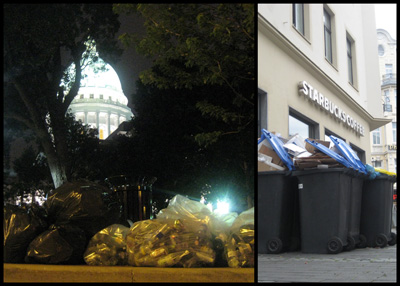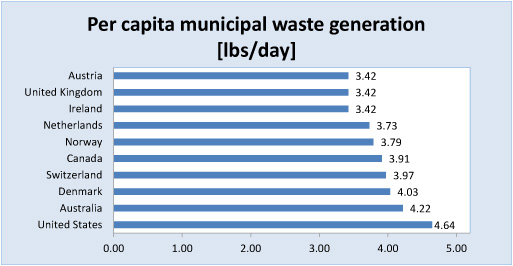Like most in the age of digital point and shoot cameras, I am an amateur photographer. Family events, nature, petsand for the predictable college student on Facebook, beer—all are familiar material for that never ending quest to capture life in the way we wish to portray it. And the way I wish to portray it finds expression in an object that is as common as it is overlooked. I have been enthusiastically documenting this object for years and hope to someday put together a tasteful photo journal. It is sure to be found at any function, neighborhood, church, school, mall or place of public gathering. Christmas, Easter, the Fourth of July and Thanksgiving of (insert any recent year here) was a particularly good year to catch a glimpse of this. Maybe you have guessed it by now: I shoot garbage. The images in the trash collage here are from the aftermath of a Fourth of July concert in Madison, Wis., and a Starbucks (the volume in the picture was produced multiple times during the week).
Trash is one the most salient features of modern culture. It is everywhere and nearly everything we do produces it. According to the EPA, per capita municipal solid waste (MSW) generation in the U.S. rose from 2.68 to 4.43 pounds between 1960 and 2010. The waste is either recycled, goes to landfills, or is combusted, the heat from which is sometimes used as fuel. In 2010, 54.3 percent was discarded, 34 percent was recovered in the form of recycling and composting and 11.7 percent was combusted for energy recovery. Residential waste is estimated to contribute 55-65 percent of total MSW generation.
How do we stack up globally? As is unfortunately the case with most environmental indicators, we trail the pack and in some ways have set the low standard. The affluent of countries with greater income inequality are also American-style wasteful, although a large percentage of a population living in poverty keeps those countries off of a top 10 list (India, China, Brazil, South Africa).
Let’s get back to the local scene. If you were to venture down any Murfreesboro street on pickup day you would notice a new and disturbing trend: the second can. The first can is already obscene in size and would have made great material for a Charlie Chaplin silent satire. Solar panels, energy efficient windows, hybrid cars—all require a careful cost benefit analysis. But not this! There is little or no cost, and only benefit! There is also an economic benefit to the city as a whole, which we will see later. With a little planning, this deplorable and unconscious status quo can easily be challenged.
What you can do: The Three R’s and Composting
Reduce, Reuse, Recycle
Order and emphasis are key here. First and foremost: Reduce. This can be accomplished by buying in bulk (especially where items are sold loose) and reducing consumption in general in all of its insidious forms. A tried and true method is to “sleep on it.” Most likely you will awake refreshed and in a clutter-free house. The second, Reuse, is fairly self-explanatory and works best when accompanied by a bit of creativity. The last R, Recycle, is what happens with the small quantity that remains after the first two steps. Although an essential component of the sustainability movement, I am a bit at odds with the drive to recycle. As with the zealous campaign to eliminate plastic bags, one must be careful to not let recycling become another symbolic victory. It is less wasteful and more practical to use cloth bags, but what really counts is what the bag carries. A cloth bag carrying 10 pounds of beef is not better, in terms of sustainability, than 10 plastic bags carrying fruit and rice. In the same way, having a large green container filled to the brim with recyclables is not the goal. Both must be part of a broader shift in lifestyle, and neither serves as a substitute for change. The reason I have gone into such detail on this point is personal experience. While working in Louisville I introduced a recycling box to the company break room. After a few months of seeing fast food refuse fill the container, I began to suspect that the box was silencing the true message. Anytime an issue related to sustainability would come up amidst the forced diplomacy of the professional environment, the answer invariably came, “Well, we recycle!”
Alas, it is unlikely that even the most aggressive reducing and reusing could eliminate trash, at least not in Murfreesboro. The options just don’t exist (which is why a demand for non trash producing goods and services has to be shown). So for the amount that is recycled, curbside pickup is a good option. All in One Recycling offers this service for $12 a month in Rutherford County.
Composting
Over 12 percent of municipal waste is estimated to be food scraps. Composting is incredibly easy and creates rich soil for gardens and potted plants. There any many different ways to do this, from store-bought composters to homemade units (a lot more fun!). After starting, it is hard to imagine not composting, it is that simple. A very good guide on how to build your own composting bin can be found at the University of Missouri Extension website. I built a three-stage unit similar to the one outlined, and it is working well.
A last topic that can’t be lacking in any good discussion involving trash are the so-called Pay as You Throw (PAYT) and Garbage by the Pound (GBTP) systems. Collection fees are based on the volume or weight of a household’s trash, rather than through property taxes or a fixed fee. It is a win-win way to do things. There is a growing body of documentation that supports the effectiveness of these programs. The city of Malden, Mass., for example, is saving $2.5 million and reducing MSW generation by around 50 percent by implementing a PAYT system. According to the EPA, over 7,000 communities are taking advantage of intelligent trash pickup. Let’s put the ‘Boro on the map! I vote that we put the money saved into serious bike lanes that connect with the Greenway (not like the one that starts nowhere and cuts through the turn lanes of hurried shoppers and ambulances on Thompson Lane).
Other suggestions
-Buy in bulk. Pa Bunk’s and Sunshine Health and Nutrition both offer loose bulk items in Murfreesboro. I like to bring my own glass jars. They are pre-weighed at the store so that the weight of the glass isn’t accounted for at the checkout counter. It is really a great system; I have been using the same jars for years! You usually save money and get good, locally provided organic products.
-Declare a personal boycott on Styrofoam; carry Tupperware in the trunk at all times. Enjoy the respect and admiration of all at the restaurant who take notice.
-Avoid disposable tableware; respectfully make fun of those who do. Eventually we will get to a point where it is an embarrassment to produce two bags of trash at a group gathering.
-Set personal reduction goals.
-Vote with your wallet; let stores know that you prefer less or no packaging.
-Be part of the discussion!















